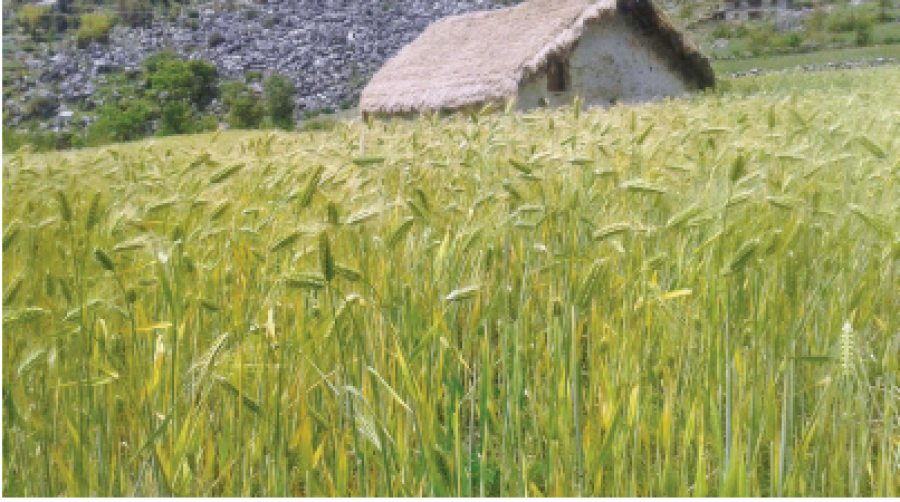Money
Winter crops lie unharvested in the fields as the lockdown forces farmers indoors
There are many who say that farmers should be allowed to work in the fields, as there is little danger of contracting Covid-19 while working five or six feet apart.
Sangam Prasain
Hari Narayan Chaudhary’s standing wheat crop in Kailali is ready for harvest. Due to the abundant winter rains this year, he was upbeat about higher yields. But now, he is worried. The ongoing nationwide lockdown enforced by the government to contain the spread of the coronavirus means that he won’t be able to harvest or transport the grain.
The nationwide lockdown, currently imposed until April 7, has forced tens of thousands of farmers indoors and away from their fields while also creating a shortage of hired labourers to work in the fields.
The agriculture sector, which contributes 27 percent to the country's GDP, has already been affected by the comparatively low summer output, of paddy in particular, caused by the delayed monsoon, floods and disease.
Now, the Covid-19 pandemic has further dampened the prospects of a good spring harvest to make up for the summer months.
Wheat is cultivated in over 900,000 hectares of land and it is currently harvest season.
"The crops will soon wither away,” said Chaudhary. “But what else can we do but let them die? It’s not safe to go outside given the current situation.”
Shivaraj Bhatta, another farmer in Kailali, said that most labourers had returned to their native villages due to the lockdown and there was no one to work the fields.
“Even if we could hire help, it wouldn’t be wise at this time,” said Bhatta.
As with most other sectors, the ongoing lockdown is expected to hit agriculture hard, given the halt to the spring harvest in absence of any farmhands.
"The farm labour movement has virtually stopped. There are no drivers to operate combined harvesters in many parts of the country," said Mahadev Prasad Poudel, senior agricultural economist at the Department of Agriculture. "If the lockdown extends, farmers will not even be able to plant maize and spring paddy."
This will in turn lead to a slowdown of Nepal's economic growth, which is largely driven by the agriculture sector, said economist Keshav Acharya.
The Asian Development Bank has revised Nepal's economic growth by 1 percent to 5.3 percent, based on the impact of the coronavirus. Before the spread of Covid-19, the multilateral funding agency had estimated Nepal's growth at 6.3 percent this fiscal year, which ends mid-July, already a sharp decrease from last year's 7.1 percent growth.
The new 5.3 percent figure is based on the current scenario with the caveat that the economy could slow down further if the situation does not improve.
“Millions of tonnes of fresh vegetables and ready-to-harvest cereal crops will not be coming into the market," said Acharya. "Farmers won’t be able to sell their livestock and cattle either."
Besides the harvest of wheat, according to Poudel, farmers also make money supplying high value vegetables.
"Two weeks from now, the peak vegetables season begins," he said. "But it also seems like the vegetables will rot in the fields."
As Nepal recently reported three more cases of Covid-19, including one case of local transmission, it is not likely that the lockdown will end any time soon. But some believe that farmers should be allowed to go out in the fields and work, provided that they maintain proper distance.
"There has been scarce discussion in the public sphere about the challenges faced by the farming sector," said Rameshore Khanal, a former finance secretary. "The government has to allow farmers to go out to the fields while maintaining a safe distance."
A group of rights activists, civil society leaders and former bureaucrats, including Khanal, has also appealed to the government to allow farming to continue in the mountain, mid-hills and plains, as there is no danger of spreading the coronavirus while working in the fields at a distance of five or six feet.
If and when the lockdown ends, a large proportion of labour migrants to India, the Gulf, Malaysia and elsewhere will be returning home due to the downturn in the global economy, and they will need jobs.
"Indeed, this trend has already begun. Nepal’s international job migrants make up a large part of the population and come mainly from farming households. It will therefore benefit the society and economy if the returnees are facilitated to return to the farmstead," the group said in a statement.
"The exposure, knowledge and skills brought back by this community of migrants will be of great help in modernising agricultural practices. A strategy that builds a welcoming environment for the returning youth can turn the coronavirus crisis into an opportunity to make the country self-sufficient in food production," the statement reads.
Even before the lockdown was instituted, thousands of migrants are already estimated to have returned to Nepal.
If the government is unable to allow farmers to return to their fields then it will have to make other arrangements to ensure their livelihoods, said Khanal, the former finance secretary and one of the signatories of the statement.
“But for long-term growth and commercialisation of the agriculture sector, the government should come up with financial packages for big corporate houses to engage them in mass commercial production," said Khanal.
Whether or not the government takes a decision, farmers like Chaudhary say that they will be compelled to go out into the fields from next week, or they won’t have any food grains for next year.
"It’s not safe to go outside given the current situation," said Chaudhary. “But we don't have any other option.”




 26.22°C Kathmandu
26.22°C Kathmandu















